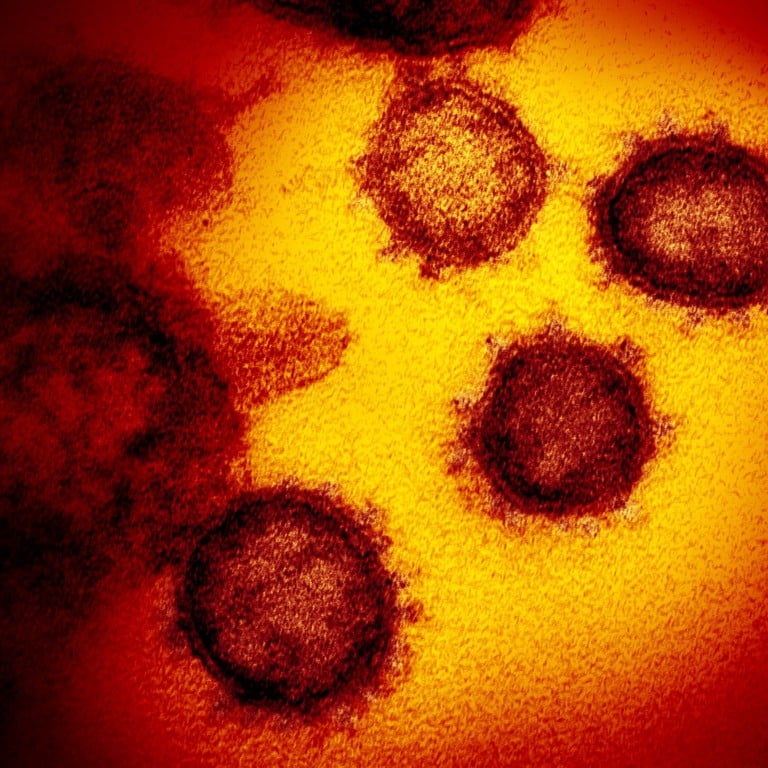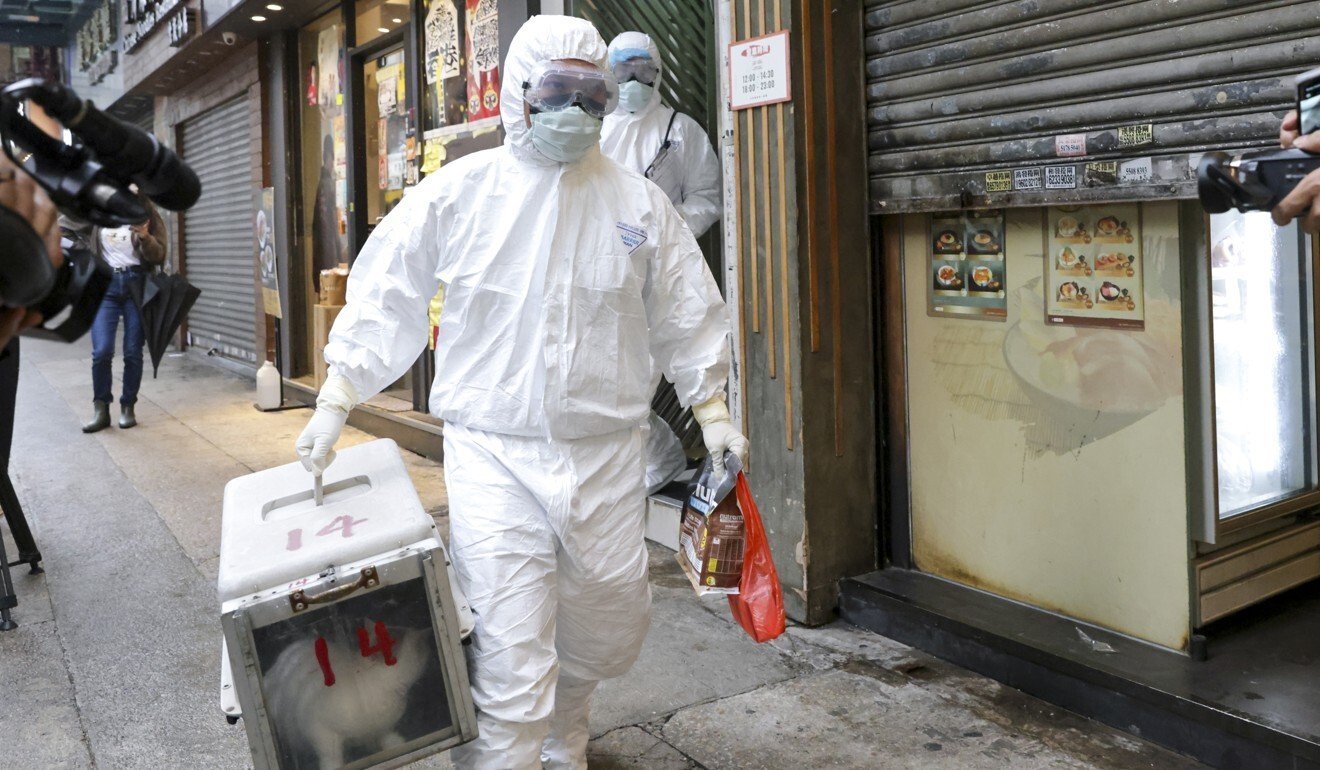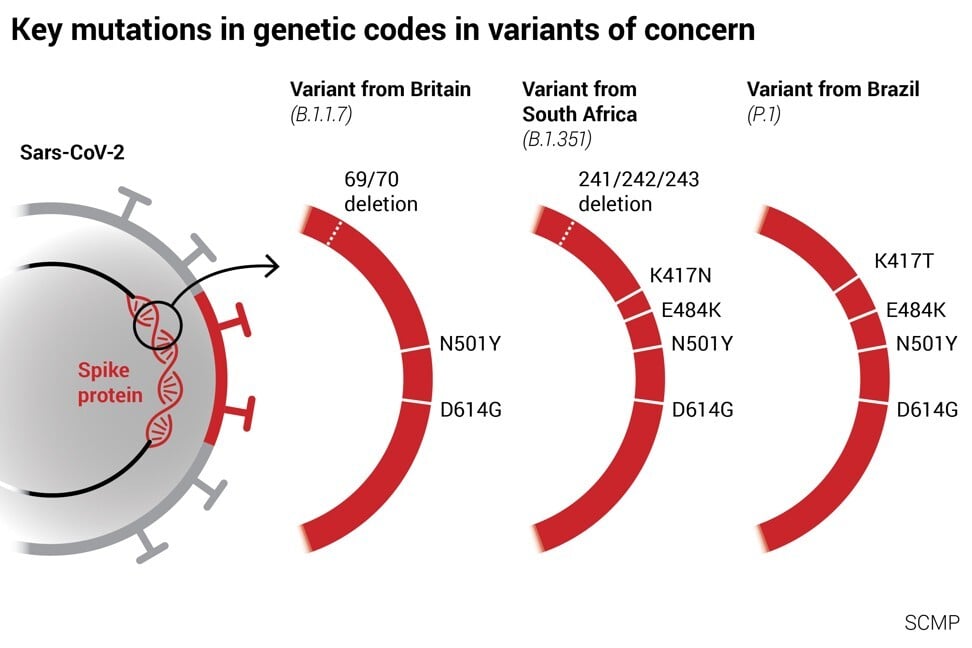
Explainer | Coronavirus: what’s the difference between ‘variants’ and ‘mutants’? With Hong Kong on edge over new cases, here’s what you should know
- City has so far uncovered 10 local cases of variants in the community, as fears grow this could be the tip of the iceberg of a new wave
- Expert stresses protection against new virus forms remains the same – mask up and get vaccinated
This story has been made freely available as a public service to our readers. Please consider supporting SCMP’s journalism by subscribing.
How did variants emerge?
Viruses mutate naturally over time when they replicate. Dr Siddharth Sridhar, a clinical virologist from the University of Hong Kong, said it remained unknown how exactly such coronavirus variants surfaced, but he pointed to three main possibilities.
“During continuous transmission, the virus will develop some mutations enabling it to infect people more easily or be transmitted more effectively,” Sridhar said, adding that variants with these features would become dominant under the Darwinian concept of survival of the fittest.
Another possible explanation centred on animals as the source, the expert said. He noted that a lot of animals were also susceptible to the coronavirus, such as cats, tigers and minks.
“Some people have argued that, for example in the case of the [variant first reported in Britain], it might have been human-to-animal transmission, [and back] to human,” Sridhar said, noting the virus could have mutated in its animal host.
The third possibility was that of the virus remaining in the body of a chronically ill person for a prolonged period of time and mutating within that host, who may not have sufficient immunity.
“Over time, some fitter variants may emerge, and this kind of patient could be a source for this resistant virus,” Sridhar said.

Are they likely to trigger a bigger outbreak or kill more people?
This depends on the variant type. Currently there are three of concern classified by the World Health Organization (WHO): the variant first reported in Britain, officially known as B.1.1.7; the one first found in South Africa named the B.1.351; and another from Brazil known as P.1.
Variants in this category have been shown to have higher transmissibility or severity of symptoms, with public health measures or treatment possibly less effective.
According to the US Centres for Disease Control and Prevention, the variant from Britain is about 50 per cent more virulent, and there can be a higher chance of more severe symptoms.
Variants from Brazil and South Africa were also found to be more transmissive, but as yet, there has been no data showing they are more fatal.
Sridhar noted that the E484K mutation in the variants from Brazil and South Africa could enable the virus to dodge a vaccine-induced immune response. This also meant recovered Covid-19 patients could be reinfected with the variants.
For the variant B.1.617 first reported in India, it has not been included by the WHO in the category warranting concern. Scientists are still studying if it is behind the record-high daily number of cases in India over the past month.
Experts warn mutated strain could be spreading after city orders hundreds more into quarantine
What are the misconceptions about variant names?
There has been confusion over terms such as “mutations” or “mutant” in describing newly emerged variants. “Mutation” refers to a change in the genetic sequence of a virus. For example, the N501Y mutation, frequently cited by Hong Kong health officials, indicates a change in position 501 within the gene of the virus.
“A variant is a virus strain with a collection of mutations,” Sridhar said. “It has a group of mutations that we can identify as something unique.”
For example, B.1.1.7, the variant from Britain, carried the N501Y mutation. The variants from Brazil and South Africa both carried the N501Y and E484K mutations, though there are still more differences between them.
“Terms like ‘mutant’ are not really helpful,” Sridhar said. “It sounds scary, but what does it actually mean? Variant is a much more balanced term.”
While “strain” has also been used to describe the new variants, Professor Sharon Peacock from the University of Cambridge previously said she would avoid this term, as it was used for Sars-CoV-2, the virus causing Covid-19.

How many variant cases have been detected locally in Hong Kong, and should we be worried?
Since the first case was revealed to the public on April 16, involving a 29-year-old man arriving from Dubai, Hong Kong has so far uncovered 10 local cases involving coronavirus variants in the community. At least five of them, including a 10-month-old baby girl, were confirmed with the variant from South Africa. Five of the 10 cases involved domestic helpers.
Including other variant cases detected by tests at Hong Kong International Airport and quarantine hotels, the city has so far detected 260 such infections. Among these, 134 concerned the variant first identified in Britain, and at least 46 were the type from South Africa.
Experts have voiced fears that the detection of local variant cases could suggest there were loopholes in the city’s quarantine measures.
Infectious disease expert Dr Joseph Tsang Kay-yan said the variant cases confirmed on Wednesday involving two domestic helpers could indicate more than one chain of transmission already going on in the community, and the city could be on the verge of a new wave of infections.
Quarantined Hong Kong residents question why vaccination made no difference
Do we need to take extra precautions?
The same general Covid-19 rules apply. “Wear a mask. Avoid crowded, poorly ventilated indoor areas,” Sridhar said. “On top of that, get vaccinated.”
Despite studies suggesting vaccines could be less effective against some variants, he stressed they were not totally ineffective.
“Even with variants, [the vaccines] can protect one against severe Covid-19,” he said. “We are getting a vaccine against a severe disease. It would be fine for me if I don’t need to die after getting infected.”


